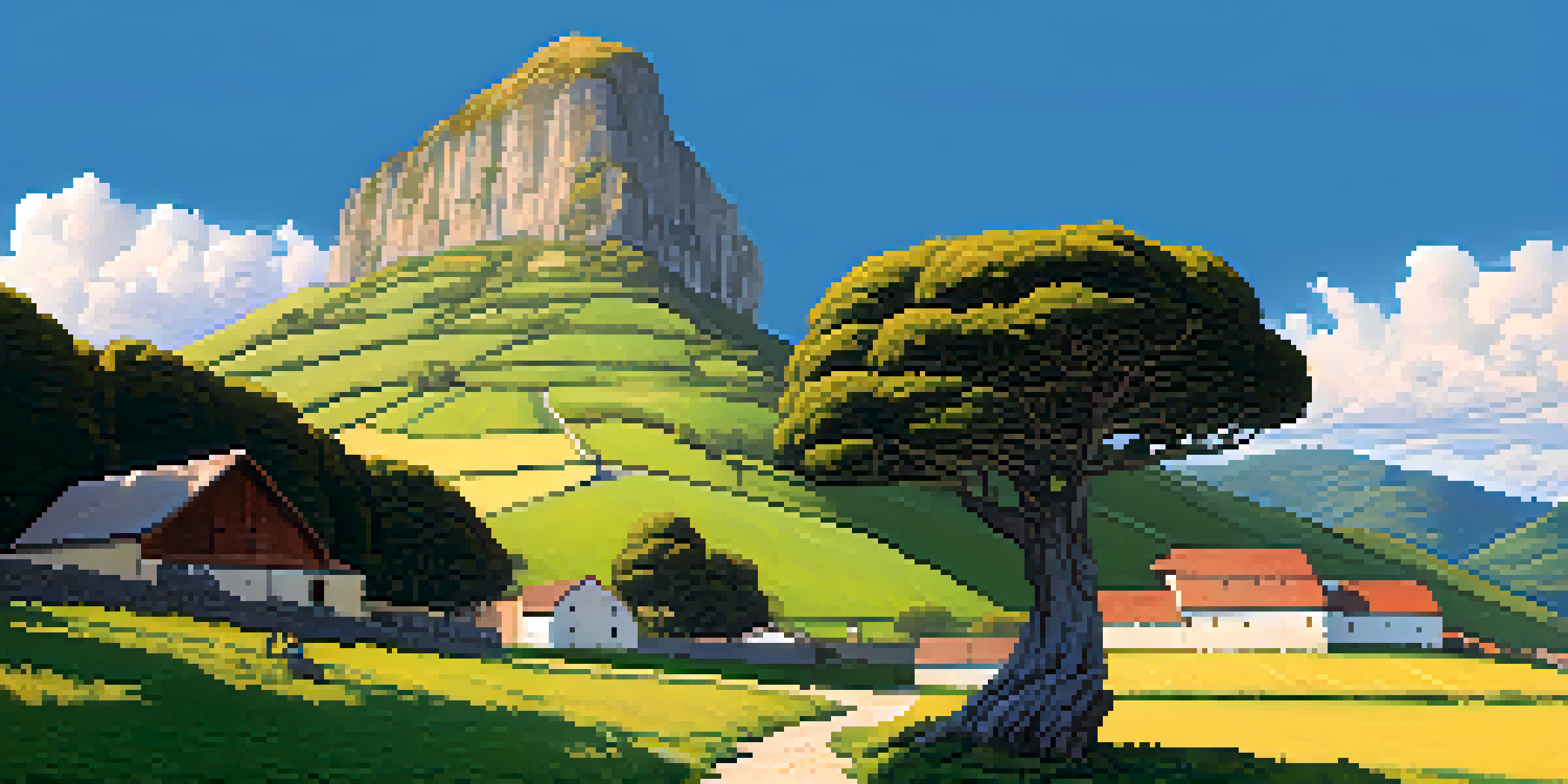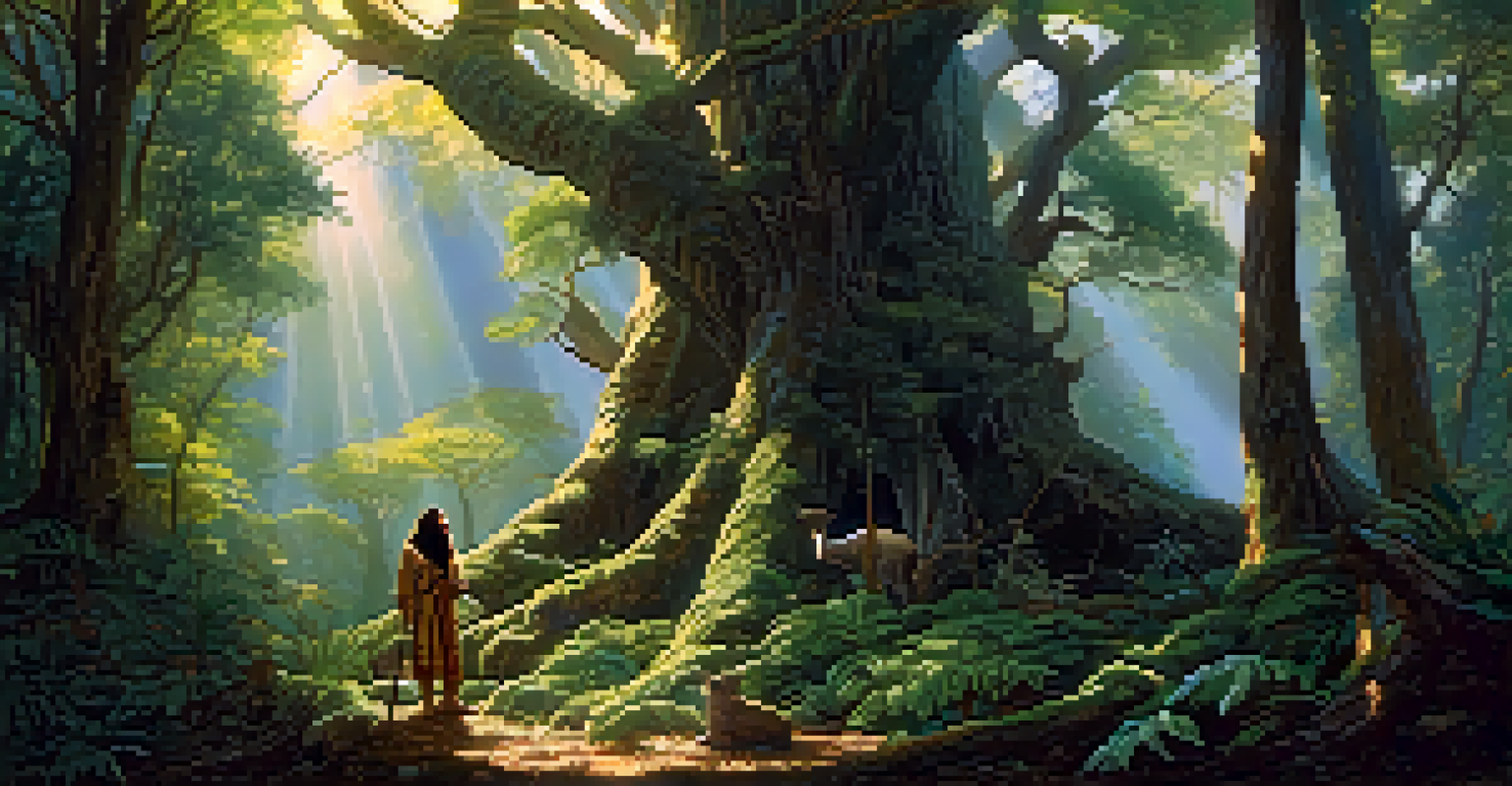Folk Tales of the Basque Country: Giants and Mythical Beings

Introduction to Basque Folk Tales and Their Significance
The Basque Country, straddling the border between Spain and France, is rich in cultural heritage, particularly through its folk tales. These stories often feature giants, mythical beings, and supernatural events that have been passed down through generations. They serve as a fascinating window into the values, beliefs, and fears of the Basque people, offering insights into their historical context.
Folklore is the heart of a culture, revealing its values, beliefs, and fears.
In these narratives, everyday life intertwines with the extraordinary, allowing listeners to explore complex themes like bravery, love, and the struggle against adversity. For the Basques, these tales are not merely stories but a way to connect with their identity and history. Each region boasts its unique versions, showcasing the diversity within this vibrant tradition.
With a rich tapestry of characters and adventures, Basque folk tales remain a vital part of the cultural landscape, enchanting both young and old. As we dive deeper into these stories, we'll encounter giants and mythical beings that are central to the Basque folklore, each with their own unique attributes and tales to tell.
The Giants of Basque Folklore: Tall Tales and Legends
One of the most captivating aspects of Basque folklore is the presence of giants, known as 'Jentil.' These towering figures are often depicted as strong and somewhat mischievous beings who once roamed the mountains and valleys. Their legends often revolve around their interactions with humans, sometimes protecting them and at other times causing chaos.

An example is the tale of 'Mikelats,' a Jentil who is said to have built the impressive stone structures scattered throughout the Basque landscape. The stories of these giants often reflect the struggles between nature and humanity, highlighting the respect that the Basques have for their environment. This connection showcases how the giants embody both the power of nature and the consequences of human actions.
Basque Tales Reflect Cultural Values
Basque folk tales serve as a window into the values, beliefs, and identity of the Basque people, intertwining everyday life with extraordinary themes.
Through these legends, we see the giants not just as mythical creatures but as symbols of strength and resilience. They serve as a reminder of the importance of harmony between humans and the natural world, a theme that resonates deeply with the Basque people.
Mythical Beings: The Enigmatic Creatures of the Basque Country
In addition to giants, Basque folklore is teeming with mythical beings that add a layer of enchantment to its stories. One such creature is the 'Basajaun,' a hairy, human-like figure who is both protector of the forests and a wise guide to those who respect nature. Tales of Basajaun emphasize the value of environmental stewardship and the wisdom of living in harmony with the land.
Stories are the windows to our past, connecting us to our roots and guiding our future.
Another intriguing character is 'Mari,' the powerful goddess of nature and fertility. She is often depicted as a beautiful woman who can transform into a crow. Mari's presence in folklore reflects the deep connection the Basques have with the earth and its cycles, illustrating their reverence for femininity and motherhood.
These mythical beings enrich the cultural narrative, offering moral lessons and embodying the values of the Basque people. They serve as reminders of the interplay between humanity and the supernatural, inviting listeners to explore the mysteries of life through the lens of folklore.
The Role of Nature in Basque Folktales
Nature plays a pivotal role in Basque folk tales, often depicted as a living, breathing entity that influences the lives of its inhabitants. The mountains, forests, and rivers are not just backdrops but integral characters in the narratives, shaping the adventures and trials of both humans and mythical beings. This connection reinforces the importance of respecting and preserving the natural world.
Many tales illustrate the idea that nature can be both nurturing and destructive, reflecting the duality of life itself. For example, characters may seek the help of giants to overcome natural obstacles, or they may face the wrath of mythical beings when they disrespect the land. Through these stories, the Basque people convey a profound understanding of nature's power and its essential role in their lives.
Giants and Nature in Folklore
The presence of giants like 'Jentil' in Basque folklore symbolizes the struggle between humanity and nature, emphasizing the importance of harmony with the environment.
By weaving nature into their folktales, the Basques emphasize their cultural identity and relationship with the environment. This theme continues to resonate today, reminding us of the need for balance and harmony in our interactions with the world around us.
Moral Lessons Embedded in Basque Tales
Basque folk tales are not just entertaining; they often carry deep moral lessons that reflect the values of the community. Many stories highlight the importance of bravery, kindness, and respect for nature, encouraging listeners to embody these virtues in their own lives. For instance, characters often face challenges that require courage and cleverness, teaching the audience about resilience and resourcefulness.
In tales featuring giants, the moral often revolves around the consequences of arrogance and the strength found in humility. The interactions between humans and giants serve as cautionary tales, reminding listeners of the importance of understanding one's place in the world and the need for cooperation with others, including those who may seem different.
By embedding these lessons in their folklore, the Basques create a framework for ethical behavior that has been passed down through generations. This aspect of storytelling not only entertains but also educates, fostering a sense of community and shared values among the Basque people.
Modern Interpretations of Basque Folklore
As times change, so too do the ways in which Basque folk tales are interpreted and shared. Modern artists, writers, and filmmakers are drawing inspiration from these rich stories, reimagining them for new audiences while preserving their core messages. This revival of interest helps to keep the folklore alive, ensuring that younger generations stay connected to their cultural heritage.
For example, contemporary literature often explores the themes of giants and mythical beings through a modern lens, addressing current social issues and personal struggles. This adaptability highlights the timeless nature of these tales, allowing them to resonate with people today while still honoring their origins.
Moral Lessons in Basque Stories
Embedded within Basque tales are moral lessons that promote virtues such as bravery and respect for nature, fostering a sense of community and shared values.
By embracing both traditional and modern interpretations, the Basque people ensure that their folklore remains relevant and vibrant. This ongoing dialogue between past and present enriches the cultural landscape and fosters a deeper appreciation for the stories that shape their identity.
Conclusion: The Enduring Legacy of Basque Folk Tales
In conclusion, the folk tales of the Basque Country, filled with giants and mythical beings, offer a captivating glimpse into a rich cultural heritage. These stories not only entertain but also convey important moral lessons and reflect the deep connection between the Basque people and their natural surroundings. As we explore these narratives, we uncover the values that have shaped their identity over centuries.
The enduring legacy of Basque folklore lies in its ability to adapt while remaining rooted in tradition. Whether through oral storytelling, literature, or modern adaptations, these tales continue to inspire and resonate with audiences both near and far. They serve as a reminder of the power of storytelling to connect us across time and culture.

As we celebrate the giants and mythical beings of the Basque Country, we also honor the spirit of the people who have kept these stories alive. In doing so, we ensure that the magic of Basque folklore continues to thrive for generations to come.